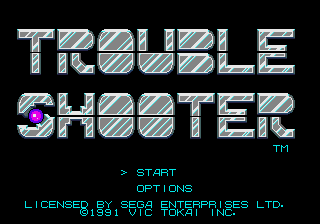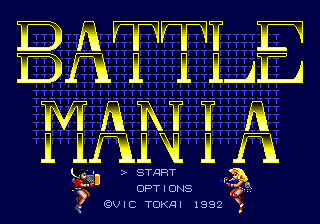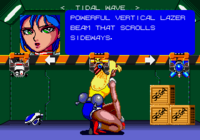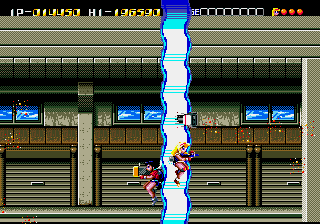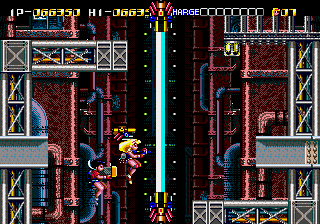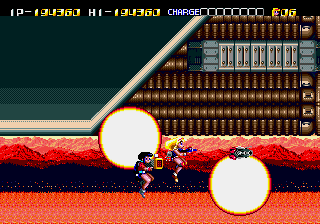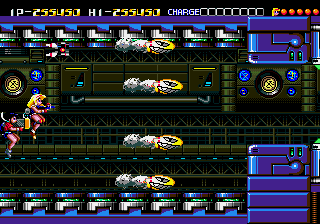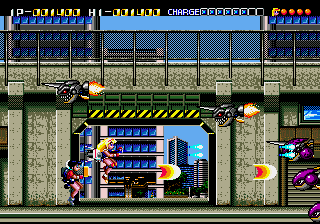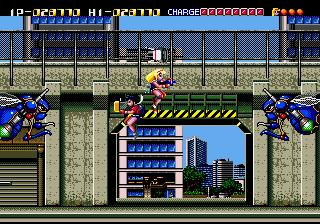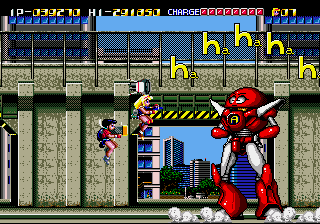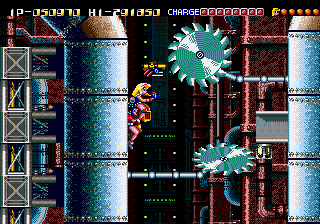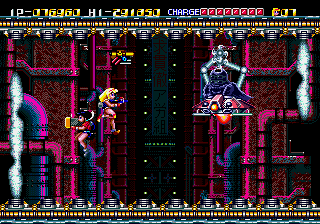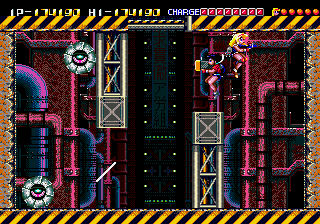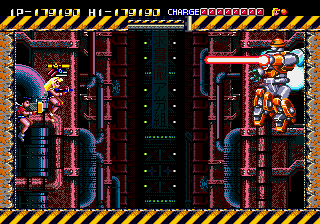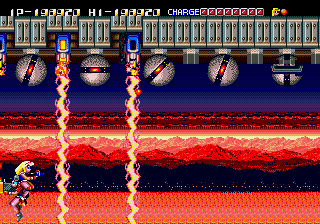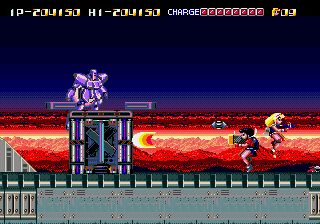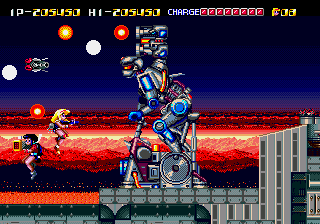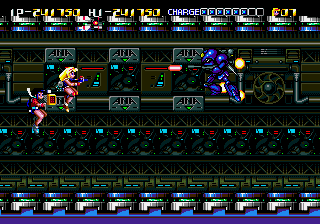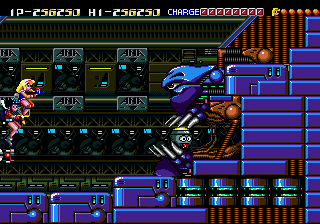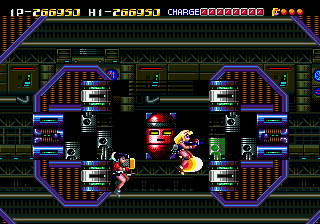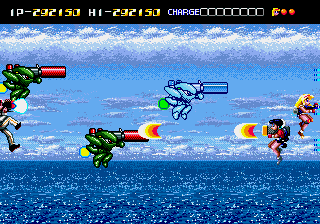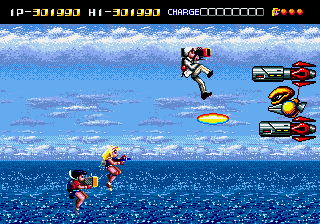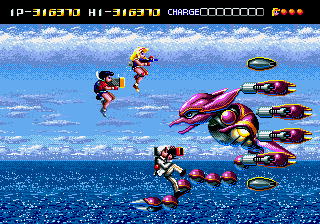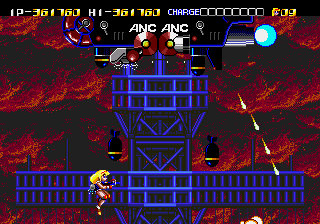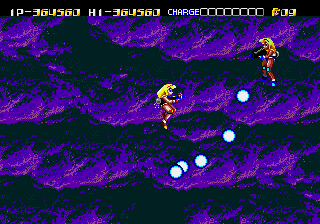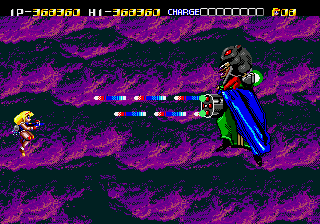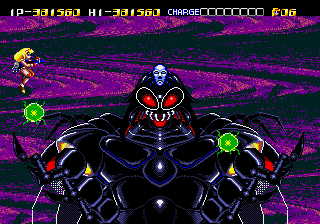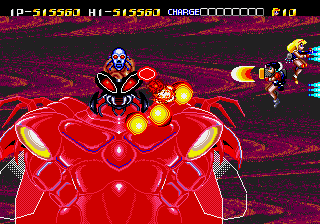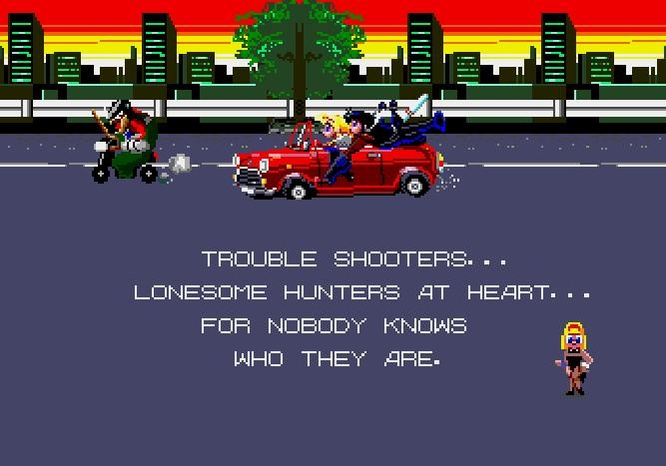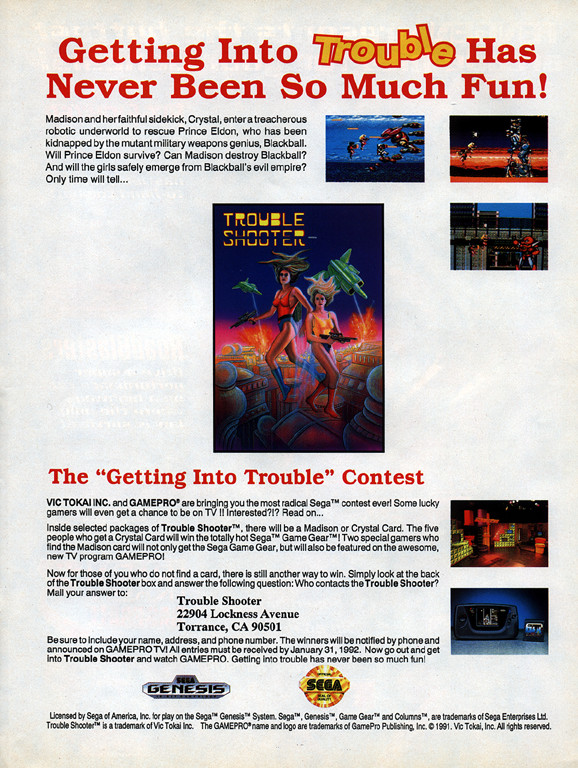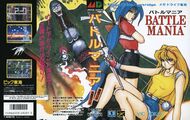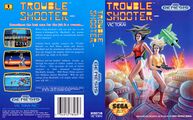Trouble Shooter
From Sega Retro
| |||||||||||||||
| Battle Mania/Trouble Shooter | |||||||||||||||
|---|---|---|---|---|---|---|---|---|---|---|---|---|---|---|---|
| System(s): Sega Mega Drive | |||||||||||||||
| Publisher: VIC Tokai | |||||||||||||||
| Developer: VIC Tokai, Graphic Research (sound) | |||||||||||||||
| Genre: Shooting[1][2] | |||||||||||||||
| Number of players: 1 | |||||||||||||||
|
Trouble Shooter, called Battle Mania (バトルマニア) in Japan, is a shoot-'em-up developed and published by VIC Tokai for the Sega Mega Drive in 1991 in the US and in Japan in 1992.
The main characters were influenced by the novel Dirty Pair.
Contents
Story
Madison (Mania Ohtorii, 大鳥居マニア, in the Japanese version) and Crystal (Maria Haneda, 羽田マリア, in the Japanese version), a sister team called the "Trouble Shooters," are called to rescue the King's son, who has been kidnapped by the evil Blackball (Morgstein, モルグスティン, in the Japanese version) and his minions.
Gameplay
The game is a side-scrolling shooter. Mania and Maria wear jetpacks and can fly. The player controls Mania and can move her in any direction using the D-Pad. She shoots her primary weapon with ![]() , which can be held for rapid-fire. Maria follows Mania and fires when she fires. Though their weapons cannot be aimed, they do deflect slightly upward or downward, each in an opposite direction, as the characters move up or down. While Mania always faces to the right, Maria can be turned around with
, which can be held for rapid-fire. Maria follows Mania and fires when she fires. Though their weapons cannot be aimed, they do deflect slightly upward or downward, each in an opposite direction, as the characters move up or down. While Mania always faces to the right, Maria can be turned around with ![]() , allowing her to fire in either direction. The player can thus choose whether to use Maria to provide additional strength to Mania's fire or to cover the opposite flank. Maria's weapon starts fairly strong but cannot be upgraded, whereas Mania's weapon is initially comparatively weak but can be upgraded by finding power-up items. Both characters can neutralize enemy projectiles with their own. Some stages contain barriers that the player can use to separate the pair and move them more independently.
, allowing her to fire in either direction. The player can thus choose whether to use Maria to provide additional strength to Mania's fire or to cover the opposite flank. Maria's weapon starts fairly strong but cannot be upgraded, whereas Mania's weapon is initially comparatively weak but can be upgraded by finding power-up items. Both characters can neutralize enemy projectiles with their own. Some stages contain barriers that the player can use to separate the pair and move them more independently.
Before the first four stages, the player is given a choice of power booster. This is a drone that follows the pair and provides a Super Weapon. After collecting two Power Up items, the drone also provides additional support fire. Super Weapons are powerful special abilities that can be used with ![]() when the player's charge bar is full. The bar charges automatically; it charges quickly, so Super Weapons can be used multiple times per stage. Mania admonishes the player for pressing
when the player's charge bar is full. The bar charges automatically; it charges quickly, so Super Weapons can be used multiple times per stage. Mania admonishes the player for pressing ![]() before the charge bar is ready, causing the bar to reset.
before the charge bar is ready, causing the bar to reset.
Maria is invulnerable, but if Mania dies once, the game is over and the player must use a continue. There is no way to earn additional continues. Mania dies if she loses all of her health points or gets caught between a surface and the screen as it scrolls. Mania gains an extra health point every 30,000 points earned and by finding heart items. There is no limit to the number of health points that she can gain.
The game's story is conveyed through cutscenes before and after stages. The game employs humor throughout, including a fourth wall-breaking false ending.
Super Weapons
| Lightning Storm | |
|---|---|
| Two lightning bolts sweep out to the sides of the screen. | |
| Tidal Wave | |
| A powerful moving laser that follows the player's horizontal directional controls. | |
| Blizzard | |
| Large energy balls that swirl around in a progressively larger radius. | |
| Avalanche | |
| Multiple volleys of missiles in a stacked vertical formation. |
Items
| Cargo Pod | |
|---|---|
| Shoot down to release an item, then fly over to collect. | |
| Speed Up | |
| Increases Mania's movement speed. | |
| Speed Down | |
| Decreases Mania's movement speed. | |
| Power Up | |
| Increases the power of Mania's weapon. The power of her weapon is maintained from stage to stage unless Mania dies. | |
| Life Up | |
| Gives Mania another health point. There is no limit to the number of health points that Mania can have. | |
| Bonus Points | |
| Awards the player with 100 bonus points. |
Stages
| Central Line Shopping Plaza | |
|---|---|
|
Boss: Chuckles | |
| Underground Hideout | |
|
Boss: Charger | |
| Outside "Colossus" | |
|
Boss: Jack La Pain | |
| Inside "Colossus" | |
|
Boss: Piston | |
| The Escape | |
|
Boss: Winger | |
| The Prince accompanies Mania and Maria on this stage and inverts the player's directional controls while providing additional support fire. | |
| Final Stage | |
|
Boss: Blackball | |
| Mania plays the majority of this stage by herself. Maria joins her for the final phase of the last boss. |
History
Legacy
The game was followed by the Asia-only sequel Battle Mania Daiginjou in 1993.
Mania and Maria make a cameo appearance in Segagaga, released for the Dreamcast in 2001.
Versions
Localised names
| Language | Localised Name | English Translation |
|---|---|---|
| English (US) | Trouble Shooter | Trouble Shooter |
| Japanese | バトルマニア | Battle Mania |
Production credits
- Graphics - Enemies, Scroll, Opening: Doro-P
- Graphics - Enemies, Scroll, Title: Porten
- Sound Created by: Team Hyakuman-Goku
- B G M: Raika Papa
- S.E.: Bakkin! Tama
- Voice: Yuki Chan
- Program - Enemies, Scroll, Tools: Propeller Wado
- Program - Boss, Title: Saboten Cuctus
- Program - My Chara, System: Takayan
- Special Thanks to: Sho-chan, Yamachan, Simpson, Kamo-san
- English Text by: Jimee D & MC Ikeya
- And My Friendly Neighborhood: Tonboo, Jorum, & Fellows of the Lance
- Developed for Video Game Studio Space Iron Men
- Directed by: Takayan the Barbarian in Studio Space Iron Men
Magazine articles
- Main article: Trouble Shooter/Magazine articles.
Promotional material
Physical scans
| Sega Retro Average | ||||||||||||||||||||||||||||||||||||||||||||||||||||||||||||||||||||||||||||||||||||||||||||||||||||||||||||||||||
|---|---|---|---|---|---|---|---|---|---|---|---|---|---|---|---|---|---|---|---|---|---|---|---|---|---|---|---|---|---|---|---|---|---|---|---|---|---|---|---|---|---|---|---|---|---|---|---|---|---|---|---|---|---|---|---|---|---|---|---|---|---|---|---|---|---|---|---|---|---|---|---|---|---|---|---|---|---|---|---|---|---|---|---|---|---|---|---|---|---|---|---|---|---|---|---|---|---|---|---|---|---|---|---|---|---|---|---|---|---|---|---|---|---|---|
|
| 71 | |
|---|---|
| Based on 22 reviews | |
Technical information
- Main article: Trouble Shooter/Technical information.
References
- ↑ File:BattleMania MD JP Box.jpg
- ↑ 2.0 2.1 https://sega.jp/history/hard/megadrive/software_l.html (Wayback Machine: 2020-07-02 23:21)
- ↑ 3.0 3.1 3.2 GamePro, "January 1992" (US; 199x-xx-xx), page 70
- ↑ File:Trouble Shooter MD credits.pdf
- ↑ 1700 igr dlya Sega, "" (RU; 2001-xx-xx), page 30
- ↑ 1700 igr dlya Sega, "" (RU; 2001-xx-xx), page 321
- ↑ Aktueller Software Markt, "Februar 1992" (DE; 1992-01-10), page 121
- ↑ Beep! MegaDrive, "March 1992" (JP; 1992-02-08), page 37
- ↑ Consoles +, "Avril 1992" (FR; 1992-0x-xx), page 74
- ↑ Famitsu, "1992-03-13" (JP; 1992-02-28), page 38
- ↑ Game Power, "Giugno 1992" (IT; 1992-0x-xx), page 38
- ↑ Hippon Super, "March 1992" (JP; 1992-02-04), page 82
- ↑ Joypad, "Avril 1992" (FR; 1992-03-1x), page 89
- ↑ Joystick, "Mars 1992" (FR; 1992-0x-xx), page 138
- ↑ Sega Mega Drive Advanced Gaming, "January 1993" (UK; 199x-xx-xx), page 95
- ↑ Mega Drive Fan, "May 1992" (JP; 1992-04-xx), page 115
- ↑ Mega, "August 1994" (UK; 1994-07-21), page 79
- ↑ MegaTech, "June 1992" (UK; 1992-05-20), page 52
- ↑ Power Play, "3/92" (DE; 1992-02-12), page 134
- ↑ Sega Power, "May 1992" (UK; 1992-04-02), page 32
- ↑ Sega Pro, "June 1992" (UK; 1992-05-21), page 70
- ↑ Sega Pro, "April 1993" (UK; 1993-03-11), page 68
- ↑ Sega Opisaniy i sekretov, "14000 Opisaniy i sekretov" (RU; 2003-03-11), page 206
- ↑ Sega Saturn Magazine, "September 1995" (JP; 1995-08-08), page 85
- ↑ Tricks 16 bit, "Tricks Sega Gold 800 igr" (RU; 1998-03-20), page 275
| Trouble Shooter | |
|---|---|
|
Main page | Comparisons | Maps | Hidden content | Magazine articles | Video coverage | Reception | Region coding | Technical information | Bootlegs | |
| Battle Mania games for Sega systems | |
|---|---|
| Battle Mania/Trouble Shooter (1991/1992) | Battle Mania Daiginjou (1993) |
